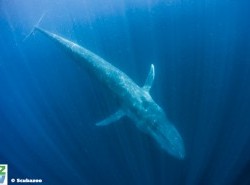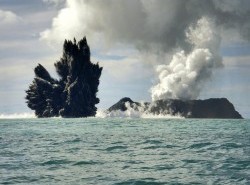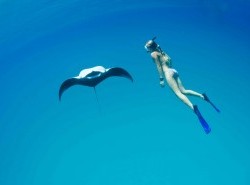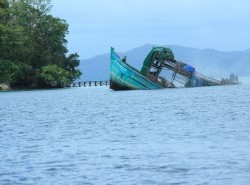Children play on the body of a pilot whale brought to shore.
The Indonesian village of Lamalera has hunted whales, sharks and dolphins for the last 500 years. Their method is to leap from a small wooden boat with a long harpoon made of bamboo and spear the animal. Once brought to shore the animal is divided in to parts and distributed to the community, partly for consumption and partly for exchanging with other inland communities for corn and rice. But in recent years, the practice has become increasingly controversial.
A whale shark is killed with a spear by Indonesia's last whale hunters.
Lamalera is found on the remote Indonesian island of Lembata in the Savu Sea. The Indonesian government officially declared 3.5 million hectares of critical marine habitat in the Savu Sea a marine protected area and since then, the islanders have feared for their survival of their traditional livelihood. Some activists believe they should stop. Though the indigenous practice of whailing to sustain the community is different from commercial whaling, there are concerns that customary protocols have been eroded.
Lamalera is a village on the remote Indonesia island of Lembata which just happens to lie in front of a key migration passage for whales
Government representatives have assured that the traditional whaling which has been supporting the surrounding communities' livelihoods will not be banned in the area immediately outside the zone, concerns still remain within the community, which is understandable considering how long they have hunted in this way. But is this still traditional whaling?
Whales have been spotted and crews race out to meet them.
Lamalera is one of the last remaining whaling communities in Indonesia and indeed in the world. It is categorized by the International Whaling Commission as aboriginal whaling. Various activists have also gone to the village to try and introduce whale watching for tourists instead of hunting. Locals continue to be very resistant.
Using wind, a traditional wooden whale hunting boat sails through the ocean. During the whole voyage the harpooner stands ready on the front of the boat with harpoon to his right. His job is crucial - a mistimed strike not only jeaopardizes the catch, but also the safety of the crew.
I visited this unique village in order to witness an ancient tradition that is integral to the community's whole way of life and indeed their whole world view. It seemed to me that an end to whaling would mean an end not only to thier livelihood but to the very thing that their sense of community and identity is built upon. But is there a way that the practice could be regulated, or adhere to certain rules?
Having spotted a large basking shark the boat holds its position and the harpooner leaps from the boat spearing the shark in the head.
With the basking shark attached to the side of the boat the fishermen work fast, scared of other sharks, to cut the body in to small enough pieces to put on the boat.
A fisherman inspects his sail on the beach. Traditionally, sails are made from the leaves of the giant gabang palm, woven into squares and then into a much bigger patchwork that is surprisingly strong.
At the house of a local artist the walls are covered with paintings of the whale hunt.
Two pilot whales are brought to the beach after being harpooned. Once on the beach the body is cut in specific parts and distributed to everyone involved in the hunting from the captain to the boat maker.
A partly dissected dolphin on the beach on Lembata Island, one of the last whale and dolphin hunting islands in Indonesia.
During a traditional whale hunt the fishermen all have their position on the boat and keep constant look-out for signs of whales, sharks, manta ray or dolphin.
A fishmean holds the penis of a large whale caught the previous year. Hanging it to dry they eat it for sexual strength.
Fisherman carry large pieces of manta ray to the beach
Slices of manta ray are hung out to dry in the sun
The skull of a whale rests on the rocky coastline where Lamalera village sits.
Familys light candles on the beach during the ceremony of 'misa arwah'. A remembrance service held once a year to pay respects to those who died at sea during a hunt, numbering 36 since 1917.
A Catholic priet leads the ceremony of 'misa arwah'. A remembrance service held once a year to pay respects to those who died at sea during a hunt, numbering 36 since 1917.










